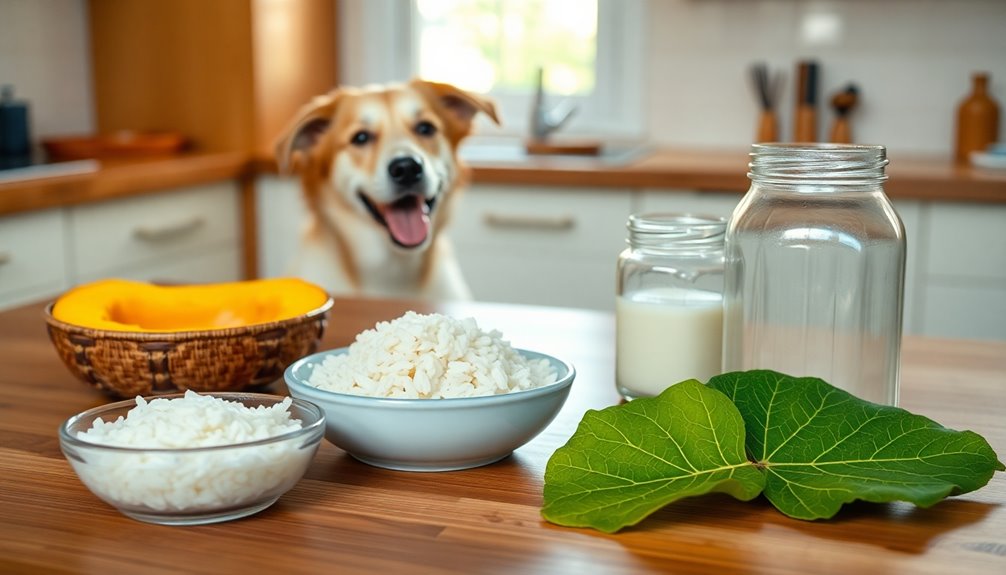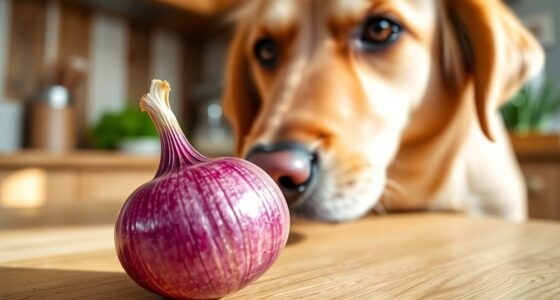If your dog has diarrhea, start with a fasting period of 12-24 hours while ensuring they stay hydrated. After fasting, introduce a bland diet of boiled chicken or turkey mixed with white rice. Adding plain canned pumpkin can enhance moisture and fiber intake. Probiotics from plain yogurt can also help restore gut balance. Keep your pup's water bowl filled to prevent dehydration. Monitor your dog's symptoms closely, and consult a vet if diarrhea persists over 48 hours or if you notice other concerning signs. There's plenty more to contemplate for effective care, so keep exploring your options!
Key Takeaways
- Implement a fasting period of 12-24 hours while ensuring your dog stays hydrated with fresh water.
- Introduce a bland diet of boiled chicken or turkey with white rice to soothe the digestive system.
- Consider adding plain canned pumpkin to the diet for added moisture and fiber.
- Probiotics, either through supplements or plain yogurt, can help restore healthy gut bacteria.
- Monitor for serious symptoms and consult a vet if diarrhea persists for more than 48 hours or dehydration signs appear.
Understanding Dog Diarrhea
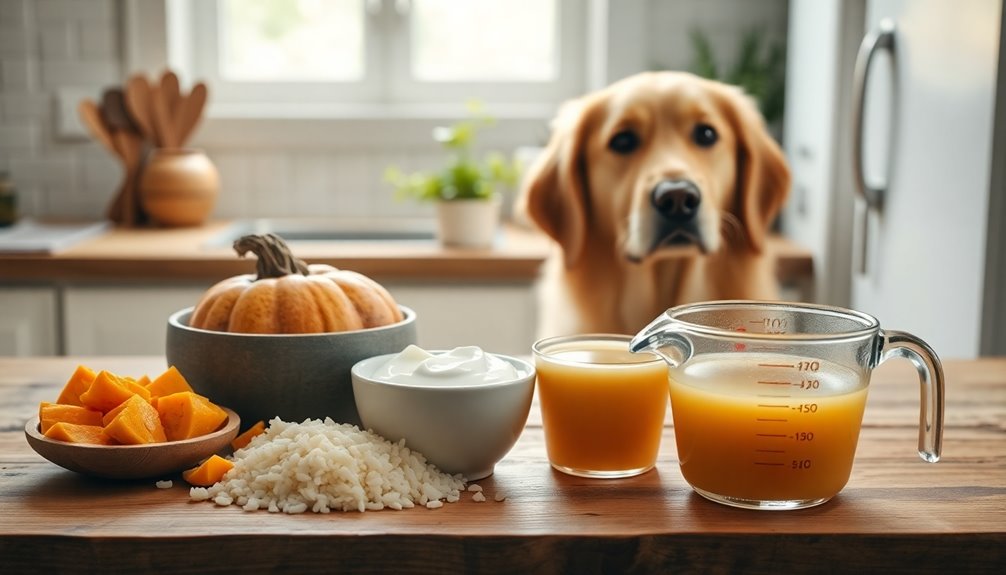
Dog diarrhea can be concerning for any pet owner, and understanding its causes is essential for effective management.
Diarrhea in dogs is characterized by loose, watery stools, often linked to dietary indiscretion, stress, or infections. While occasional diarrhea may resolve on its own, you should monitor your dog's health closely.
If symptoms persist for over 48 hours or if you notice vomiting or blood in the stool, it's time to consult your vet.
Differentiate between diarrhea and loose stools, as the latter may indicate a mild digestive upset.
For mild cases, consider home remedies like fasting for 12-24 hours, followed by a bland diet to help restore digestive balance.
Your dog's health is your priority!
Causes of Diarrhea
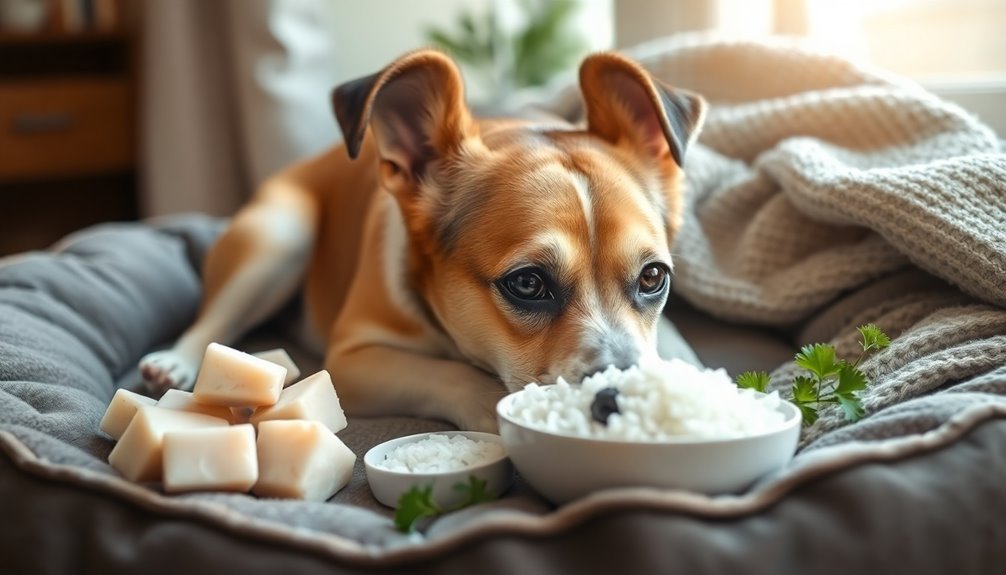
Diarrhea in dogs often starts with dietary indiscretion, like eating spoiled food or something they shouldn't.
Sudden changes in their diet can also upset their stomachs, leading to digestive issues.
Additionally, stress and emotional distress from changes in their environment can result in diarrhea, so it's important to take into account all these factors.
Dietary Indiscretion and Changes
When your furry friend indulges in spoiled food, human snacks, or even rummages through the garbage, it often leads to gastrointestinal upset and diarrhea.
Dietary indiscretion is a common cause of diarrhea in dogs, and sudden changes in diet can also disrupt their digestive system. If you've recently switched dog food or introduced new treats, your pup might experience digestive upset.
Additionally, food allergies can trigger diarrhea, particularly with certain ingredients in commercial dog food. It's essential to monitor what your dog eats to prevent these issues.
If diarrhea persists, consider home remedies for diarrhea, but always consult your vet if symptoms worsen.
Stress and Emotional Distress
Emotional distress can greatly impact your dog's digestive health, often leading to gastrointestinal issues like diarrhea.
Stress and emotional distress can stem from various sources, such as moving to a new home, changes in routine, or exposure to loud noises.
Separation anxiety, where your dog feels anxious when left alone, can also trigger diarrhea.
To help prevent these issues, monitor your dog's behavior and identify potential stress triggers.
Creating a calm environment is essential.
Regular exercise and mental stimulation can considerably reduce anxiety, thereby minimizing the risk of diarrhea.
When to Seek Help

If your dog's diarrhea lasts more than 48 hours, it's time to seek veterinary help.
Watch for signs of dehydration, like excessive thirst or dry gums, as these require immediate attention.
Trust your instincts—if something feels off, don't hesitate to consult your vet. Additionally, be aware that certain foods, like raisins for dogs, can exacerbate gastrointestinal issues and should be avoided.
Persistent Symptoms Require Attention
While it's common for dogs to experience occasional diarrhea, persistent symptoms can signal a more serious issue. If your dog has diarrhea for more than 48 hours, it's time to consult a veterinarian. Look for additional symptoms like blood in the stool or vomiting, which require immediate attention. If you suspect your dog has ingested a foreign body or toxic substance, seek veterinary help right away.
| Symptoms to Monitor | Action Needed |
|---|---|
| Diarrhea lasting 48+ hours | Consult a veterinarian soon |
| Blood in stool | Immediate veterinary attention |
| Vomiting | Immediate veterinary attention |
| Signs of dehydration | Consult a veterinarian |
| Trust your instincts | Don't hesitate to seek help |
Trust your instincts; if something feels off, reach out for professional guidance.
Signs of Dehydration
How can you tell if your dog is dehydrated? Look for signs of dehydration like dry gums, excessive thirst, and lethargy.
You can also assess decreased skin elasticity by gently pinching the skin on the back of the neck—if it doesn't spring back quickly, your dog may be dehydrated. Other indicators include sunken eyes and a decreased appetite.
Monitor urination; a significant drop can be concerning. If your dog's diarrhea lasts longer than 48 hours or is accompanied by vomiting or fever, it's time to seek veterinary attention. It's also important to be aware of the role of hydration in maintaining overall health, especially during illness.
Home Remedies for Relief

To provide relief for your dog's diarrhea, start by giving their digestive system a break through a short fasting period of 12 to 24 hours, guaranteeing they've constant access to fresh water.
Once the fasting period is over, consider these home remedies:
- Bland Diet: Feed your dog boiled chicken or turkey mixed with white rice to soothe their stomach.
- Canned Pumpkin: Offer plain canned pumpkin to add moisture and fiber, helping to firm up stools.
- Probiotics: Introduce probiotics through supplements or plain yogurt with active cultures to restore gut bacteria balance.
- Hydration: Guarantee your dog stays hydrated throughout the process to support recovery.
These simple steps can help your furry friend feel better soon!
Dietary Management Solutions

After providing some relief with home remedies, focusing on dietary management will further aid your dog's recovery from diarrhea.
A bland diet of boiled white rice and skinless chicken is gentle on the stomach and easy to digest. You can also incorporate canned pumpkin puree, which is high in fiber and supports digestive health.
If your dog isn't lactose intolerant, plain yogurt with active cultures can help maintain gut health. As your dog improves, gradually reintroducing regular food is essential; start with small portions of easily digestible foods.
Fresh cooked options, like boiled potatoes without skin, are low in fat and provide necessary nutrients without irritating their digestive tract.
Prioritize these dietary management solutions for a smoother recovery.
What to Avoid

When your dog has diarrhea, it's essential to know what to avoid in order to prevent further complications. Consider these key points:
- Don't give over-the-counter medication without veterinary guidance.
- Avoid rich foods, as they can exacerbate gastrointestinal upset.
- Steer clear of home remedies beyond a few days; if diarrhea persists, consult a veterinarian.
- Avoid introducing new foods abruptly, as this can irritate your dog's digestive system.
Additionally, foods high in sugars, salt, or spices can worsen diarrhea symptoms.
Keeping your dog's diet simple and consistent is important during this time to help them recover.
Prioritizing these guidelines can make a significant difference in your dog's health.
Monitoring Your Dog's Recovery
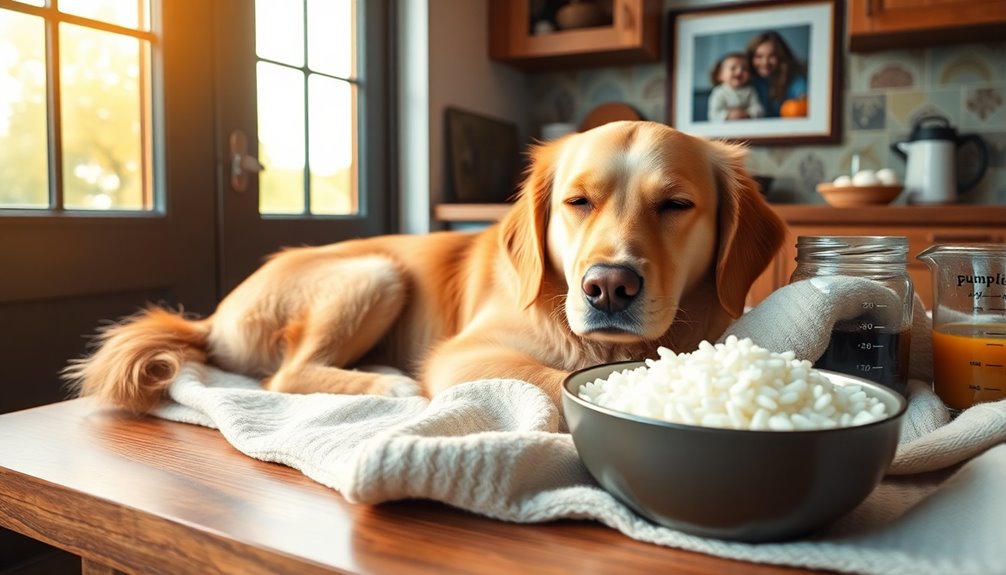
Monitoring your dog's recovery is essential, especially since diarrhea can quickly lead to dehydration and other health issues.
Keep a close eye on your dog's stool consistency and frequency to determine if the diarrhea is improving. Look for signs of lethargy or decreased appetite, as these could signal a need to consult your vet.
Verify your dog stays hydrated by tracking water intake, as dehydration is a serious concern during this time.
After 3-5 days on a bland diet, gradually reintroduce regular food while watching for any recurrence of diarrhea.
Document any changes in behavior or symptoms, including the duration of diarrhea, to provide your vet with detailed information if needed.
This proactive approach promotes a smoother recovery.
Frequently Asked Questions
What Is the Best Home Remedy for Dog Diarrhea?
When your dog's experiencing diarrhea, one of the best home remedies is a bland diet. You can try feeding them plain boiled chicken or turkey mixed with white rice.
Canned pumpkin puree is also great due to its high fiber content. Fasting for 12 to 24 hours can help, but always offer fresh water.
Adding probiotics, like plain yogurt, can restore gut balance. Just remember to reintroduce their regular food gradually once they've improved.
What Do You Give a Dog to Stop Diarrhea?
To stop your dog's diarrhea, you should start with a 12-24 hour fast, ensuring they've plenty of water to stay hydrated.
After that, introduce a bland diet of boiled chicken and white rice for a few days until their stool improves.
You can also add plain canned pumpkin for fiber.
If the diarrhea persists beyond 48 hours or there's vomiting, it's important to consult your vet for further advice.
What Human Medicine Can I Give My Dog for Diarrhea?
When you're wondering what human medicine you can give your dog for diarrhea, it's essential to proceed with caution.
Many over-the-counter medications, like Pepto-Bismol or Imodium, might seem tempting, but they can be risky without veterinary guidance.
Always consult your vet first to guarantee it's safe for your dog and to get the right dosage.
What Drink Is Good for Dogs With Diarrhea?
When your dog has diarrhea, keeping them hydrated is essential. Fresh, clean water should be your first choice, as it helps prevent dehydration.
You might also consider offering an electrolyte solution designed for pets, which can replenish lost minerals.
Bone broth is another great option; it's nutritious and gentle on their stomach.
If you want something different, plain, unsweetened coconut water in small amounts can be beneficial, too. Just monitor their intake carefully.
Conclusion
In conclusion, managing your dog's diarrhea can be straightforward with the right care and attention. Think of it like tending a garden; with the proper nutrients and monitoring, your pup can bounce back to health. Remember to keep an eye on their symptoms, adjust their diet, and don't hesitate to seek veterinary advice if things don't improve. Your furry friend depends on you to help them feel better, so stay vigilant and loving during their recovery.

